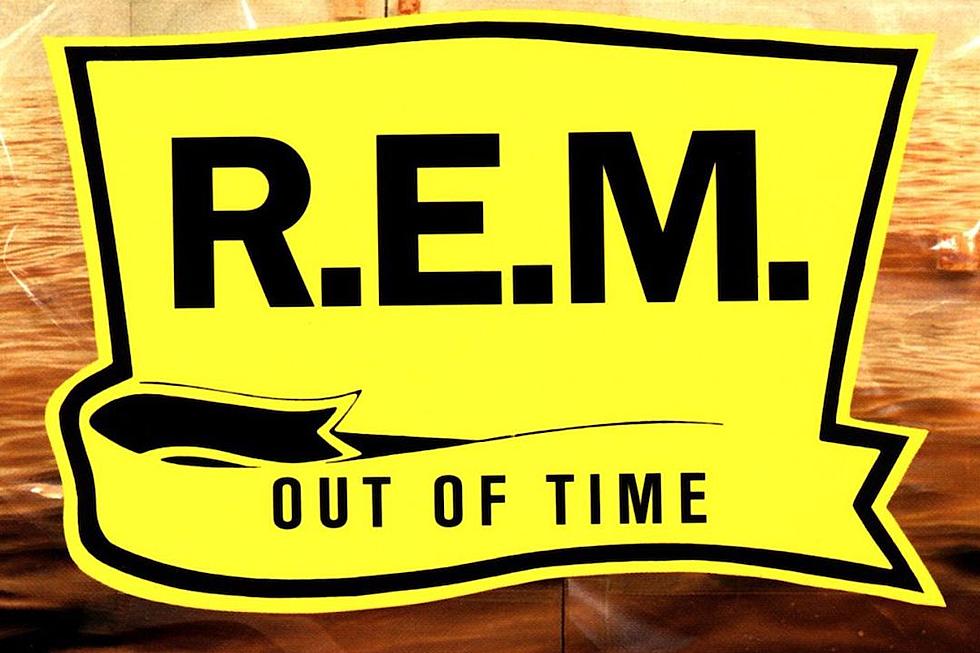
25 Years Ago: R.E.M. Lose Their Religion and Find Superstardom With ‘Out of Time’
Indie music fans held onto R.E.M. as long as they could. But by 1991, when the Athens outfit released their seventh album, Out of Time, the wheels of mainstream success had already been set in motion and couldn't be derailed.
Not that it was R.E.M.’s fault. They had always been the epitome of “alt,” the very foundation on which the Alternative Nation was built, back when they were busily crisscrossing the country via ignoble means of transport like other DIY heroes Black Flag and Husker Du.
But being college rock darlings in 1982 (when R.E.M.’s debut EP, Chronic Town, was released) was very different from ruling that roost around the time of 1987’s Document – R.E.M.'s first platinum album and the one that definitively brought the underground up onto the radar. Two albums later, alternative music as a whole had gained enough mainstream momentum to dominate the musical conversation, and its emperors just happened to be at the perfect point in their artistic evolution to ride that wave all the way to arena-sized stardom and rock radio ubiquity.
Even though Out of Time marked the moment the hoi polloi embraced alternative culture, it wasn’t just a socio-cultural phenomenon – it's a great album too. So even the old-school diehards who stigmatize the album as the beginning of the end of what they loved about R.E.M. couldn’t plausibly deny that it contained tunes every bit as arresting as what had come before. At the same time, countless new converts who had paid only casual attention to the band were drawn into the fold in greater numbers than ever before.
Part of it is thanks to the production, which didn’t differ drastically from that of R.E.M.'s previous album or two (Out of Time co-producer Scott Litt also helmed the board for both Document and 1988's Green), but Out of Time simply nudged things along to the next logical step. R.E.M.’s sound had been growing bigger and bolder since the mid-'80s, so when tasteful string orchestrations were slapped onto seven of the album’s 11 tracks, it only seemed like a slightly different sonic strata instead of an unnatural shift.
Of course, string arrangements are far from the only evidence of the band's expansive approach on Out of Time. You don’t put bass melodica, harpsichord, pedal steel guitar, horns and a guest rapper on an album when you’re trying to keep things close to the bone. And speaking of guests, how many other albums can you think of that include appearances by members of the B-52’s, the dB’s, KRS-One and jazz saxophonist Kidd Jordan?
The amazing thing is that, for all of Out of Time’s outsized production moves, it never sounds excessive. There’s a valid reason for every sonic decision, and at no point do you get the feeling that Litt and the band were simply throwing things at the wall to see what would stick.
“Radio Song,” where the band brings a surprisingly funky feel to the table and KRS-One adds his rhymes, is the most obvious departure from R.E.M.’s signature sound, but the twangy touches on “Country Feedback” and the tongue-in-cheek sugary pop of “Shiny Happy People” with Kate Pierson of the B-52s diverge from whatever one might have termed the band’s norm at that time too. Nevertheless, they still seem like they’re of a piece not only with the rest of the record but with R.E.M.’s catalog up that point, especially the previous couple of albums.
There’s no shortage of the folk-rock flavors that first snared fans as far back as Chronic Town, either. They’re present not only in the mandolin riffs at the center of “Half a World Away” and the album’s crossover hit “Losing My Religion,” but also in the earthy acoustic guitar tapestries of “Endgame” and Peter Buck’s trademark Byrds-inspired jangle on “Near Wild Heaven.” And from its propulsive opening bass riff to its elliptical lyrics, “Texarkana” sounds like it could have come off any R.E.M. album from Murmur to Green (and that’s a good thing).
Out of Time earned R.E.M. a No. 1 record, two Top 10 singles (“Shiny Happy People” and “Losing My Religion”), seven Grammy nominations and three awards and, eventually, quadruple-platinum status. And there was no going back to humble beginnings – neither for R.E.M. nor for the alternative scene itself. Six months later, Nirvana would drop Nevermind, sealing the deal even further. As for the boys from Athens, they were now men of the world; and the world was none too shy about embracing the freshly anointed alternative icons.
Worst to First: Every R.E.M. Album Ranked
More From Diffuser.fm









